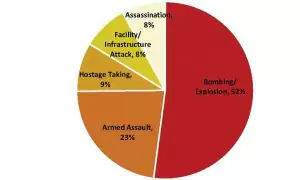

✅ AI Essay Writer ✅ AI Detector ✅ Plagchecker ✅ Paraphraser
✅ Summarizer ✅ Citation Generator
By Johannes Helmold
Terrorism is affecting countless countries in the world right now. The topic is hotly debated and a part of the collective fear of our global society. However, do common people understand exactly what terrorism is and implies? In order to educate readers, we will have a breakdown of what the term “terrorism” means, from the origins of the word and the types of terrorism.
The word “terrorist,” or terroriste in French, was invented during the French revolution in 1794. Accordingly, the first meaning of the word meantyou were a supporter of the Jacobins (The Guardian). Encyclopedia.com states that, “Jacobins (jăk´əbĬnz), political club of the French Revolution. Formed in 1789 by the Breton deputies to the States-General, it was reconstituted as the Society of Friends of the Constitution after the revolutionary National Assembly moved (Oct., 1789) to Paris. The club derived its popular name from the monastery of the Jacobins (Parisian name of Dominicans), where the members met” (Biodiversity Data Journal). This group of people are often cited for the repressive and violent acts during the Reign of Terror between 1794 and 1794. Oxford Dictionary notes that the word “terrorist” was used a derogatory term for an individual’s character, rather than a word in the context of specific actions (The Guardian).
However, there are supposedly 109 definitions of terrorism (Current Directions in Psychological Science). Each nation has different definitions of terrorism according to laws, and the international community rarely finds ways to agree upon a definitive description of terrorism. However, the modern use of the term “terrorism” is different than when it was used in the French Revolution, when it was employed as a derogatory word for those who were oppressive and violent. French historian Sophie Wahnich says this about the difference between French Revolution “terrorists” and those who attacked the World Trade Center on September 11th, 2001: “Revolutionary terror is not terrorism. To make a moral equivalence between the Revolution’s year II and September 2001 is historical and philosophical nonsense . . . The violence exercised on 11 September 2001 aimed neither at equality nor liberty” (Wahnich, Sophie). In light of this, modern terrorism can be said to be mass violence, often to enact revenge, or to follow an extremist decree or ideal.
Besides the countless definitions of terrorism, there are also varying types of terrorism. There is civil disorder, political terrorism, non-political terrorism, quasi-terrorism, limited political terrorism, official or state terrorism, domestic terrorism, and international terrorism (Purpura, Phillip). Civil disorder is collective violence which disturbs the functioning of a community; political terrorism refers to mass violence to a community to achieve political means; non-political terrorism is collective violence by an individual or mass gain; quasi-terrorism is an act that is similar to terrorism, but reaches for different ends, such as a hostage situation started by a felon; limited political terrorism is not aligned with a revolutionary approach, but is still acted upon by ideological motives; official or state terrorism is delineated by governments as committing terror acts in order to pursue political and financial goals; domestic terrorism is terrorism within a country’s boundaries, whereas international terrorism refers to mass violent acts outside of a country’s boundaries. As you can see, there are many different flavors, if you will, of terrorism, besides the 109 definitions of terrorism. This means that not only is terrorism difficult to define, terrorism is seen within the context of a country’s laws.
Terrorism is occurring worldwide, and it is a highly debated issue currently. Though the term “terrorist” began in the French Revolution as a kind of swear word, it became known as an individual who engages in mass violence for a particular end—especially ideological and political ends. However, the definition of terrorism varies within each country based on legislation, and there are also many types of terrorism to consider.
References
Shariatmadari, David (27 January 2015). “Is it time to stop using the word ‘terrorist’?” The Guardian.
“Figure 2f from: Irimia R, Gottschling M (2016) Taxonomic Revision of Rochefortia Sw. (Ehretiaceae, Boraginales). Biodiversity Data Journal 4: e7720. Https://Doi.org/10.3897/BDJ.4.e7720.” doi:10.3897/bdj.4.e7720.figure2f.
Kruglanski, Arie W., Fishman, Shire. Current Directions in Psychological Science Vol. 15, No. 1 (Feb., 2006), pp. 45–48.
Wahnich, Sophie (2016). In Defence of the Terror: Liberty or Death in the French Revolution (Reprint ed.). Verso. p. 108. ISBN 978-1-78478-202-3.
Purpura, Philip P. (2007). Terrorism and homeland security: an introduction with applications. Butterworth-Heinemann. pp. 16–19. ISBN 0-7506-7843-7.
Follow us on Reddit for more insights and updates.





Comments (0)
Welcome to A*Help comments!
We’re all about debate and discussion at A*Help.
We value the diverse opinions of users, so you may find points of view that you don’t agree with. And that’s cool. However, there are certain things we’re not OK with: attempts to manipulate our data in any way, for example, or the posting of discriminative, offensive, hateful, or disparaging material.